Official Newsjournal of the Illinois Council of Health-System Pharmacists

November 2021
Volume 47 Issue 4
Check out thefor the mostup-to-date events!
For more photos,
check out this month's
New Practitioners
Networkarticle!
Directly SpeakingIt's Time toTrade Shoes
President's MessageCan We ChangeCourse?
Features
History of Organized Hospital Pharmacy in Illinois: Organizational Relationships
Columns
College Connections
Pathways to Pharmacy in a Physics Class
A Reflection on Institutional Pharmacy
More
Officers and Board of Directors
ICHP Pharmacy Action Fund (PAC) Contributors
KeePosted Info
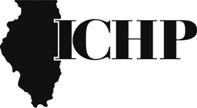
Illinois Council of Health-System Pharmacists
4055 North Perryville Road
Loves Park, IL 61111-8653
Phone: (815) 227-9292
Fax: (815) 227-9294
www.ichpnet.org
KeePosted
Official Newsjournal of the Illinois Council of Health-System Pharmacists
EDITOR
Jacob Gettig
ASSISTANT EDITOR
Jennifer Phillips
MANAGING EDITOR
Scott Meyers
ASSISTANT MANAGING EDITOR
Trish Wegner
DESIGN EDITOR
Amanda Wolff
ICHP Staff
EXECUTIVE VICE PRESIDENT
Scott Meyers
VICE PRESIDENT - PROFESSIONAL SERVICES
Trish Wegner
DIRECTOR OF OPERATIONS
Maggie Allen
INFORMATION SPECIALIST
Heidi Sunday
CUSTOMER SERVICE AND
PHARMACY TECH TOPICS™ SPECIALIST
Jo Ann Haley
ACCOUNTANT
Jan Mark
COMMUNICATIONS MANAGER
Amanda Wolff
LEGISLATIVE CONSULTANT
Jim Owen
ICHP Mission Statement
Advancing Excellence in the Practice of Pharmacy
ICHP Vision Statement
ICHP dedicates itself to achieving a vision of pharmacy practice where:
- Pharmacists are universally recognized as health care professionals and essential providers of health care services.
- Patients are aware of the training, skills, and abilities of a pharmacist and the fundamental role that pharmacists play in optimizing medication therapy.
- Formally educated, appropriately trained, and PTCB certified pharmacy technicians manage the medication distribution process with appropriate pharmacist oversight.
- Pharmacists improve patient care and medication safety through the development of effective public policies by interacting and collaborating with patients, other health care professionals and their respective professional societies, government agencies, employers and other concerned parties.
- Evidence-based practices are used to achieve safe and effective medication therapies.
- There are an adequate number of qualified pharmacy leaders within the pharmacy profession.
- Pharmacists take primary responsibility for educating pharmacy technicians, pharmacy students, pharmacist peers, other health professionals, and patients about appropriate medication use.
KeePosted Vision
As an integral publication of the Illinois Council of Health-System Pharmacists, the KeePosted newsjournal will reflect its mission and goals. In conjunction with those goals, KeePosted will provide timely information that meets the changing professional and personal needs of Illinois pharmacists and technicians, and maintain high publication standards.
KeePosted is an official publication of, and is copyrighted by, the Illinois Council of Health-System Pharmacists (ICHP). KeePosted is published 10 times a year. ICHP members received KeePosted as a member benefit. All articles published herein represent the opinions of the authors and do not reflect the policy of the ICHP or the authors’ institutions unless specified. Advertising inquiries can be directed to ICHP office at the address listed above. Image disclaimer: The images used in the Pharmacy Tech Topics advertisement and the Family Night at the Ballpark advertisement are the property of © 2013 Thinkstock, a division of Getty Images.
Copyright © 2013, Illinois Council of Health-System Pharmacists. All rights reserved.
Features
History of Organized Hospital Pharmacy in Illinois: Organizational Relationships
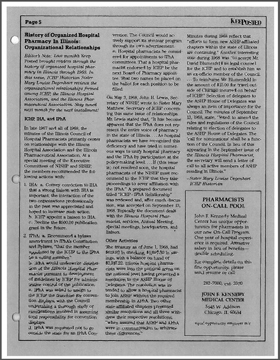 Editor’s Note: Last month’s Keep Posted brought readers through the history of organized hospital pharmacy in Illinois through 1968. In this issue, ICHP Historian Sister Mary Louise Degenhart reviews the organizational relationships formed among ICHP, the Illinois Hospital Association, and the Illinois Pharmaceutical Association. Stay tuned next month for the next installment!
Editor’s Note: Last month’s Keep Posted brought readers through the history of organized hospital pharmacy in Illinois through 1968. In this issue, ICHP Historian Sister Mary Louise Degenhart reviews the organizational relationships formed among ICHP, the Illinois Hospital Association, and the Illinois Pharmaceutical Association. Stay tuned next month for the next installment!1. IHA: a. Convey conviction to IHA that a strong liaison with IHA is important; the interaction of the two organizations professionally in the past was appreciated and hoped to increase such action.
b. ICHP appoint a liaison to IHA.
c. Decline the $500.00 publication grant in the future.
2. IPhA: a. Recommend a bylaws amendment to IPhA’s Constitution and Bylaws, “that the member appointed by the ICHP to the IPhA be a voting member.”
b. IPhA would underwrite distribution of the Illinois Hospital Pharmacist pursuant to development of guidelines by ICHP for administrative control of the publication.
c. IPhA was asked to assign to the ICHP the franchise for convention displays, with the Council undertaking a thorough study of ramifications involved in assuming total responsibility for convention displays.
d. IPhA was requested not to go outside the state for an IPhA Convention. The Council would actively support its seminar program through its own advertisement.
e. Hospital pharmacists be considered for appointments to IPhA committees. That a hospital pharmacist endorsed by ICHP be the next Board of Pharmacy appointee. That two names be placed on the ballot for each position to be filled.
Meet Julie Cho
by Julie Cho, P-2, University of Illinois at Rockord, ICHP Student Intern
 My first two summers during college I was a recreation leader at the Chicago Park District. I was able to lead a group of kids ranging from 6-14 years old. I always loved working with kids and this summer job helped me earn some money while doing something I really enjoyed. After that I worked at the UIC Pavilion throughout my college career. I was an usher and a receptionist at the arena. At the UIC Pavilion I was able to experience many types of events such as concerts, basketball games, roller derby, boxing, and many more. I always knew pharmacy school would be the next step in my career and after being accepted into UIC’s College of Pharmacy on the Rockford campus I was ecstatic.
After being accepted into the University of Illinois at Chicago College of Pharmacy-Rockford campus, I was excited and scared about moving away from my family and friends. I moved to Rockford in the middle of August 2012. Once I got there it did not take long to get adjusted. My new housemate and classmates were very welcoming. My first year of pharmacy school passed by quickly; before I knew it I was done with my first year. I was able to meet great faculty and make new friends. I can now officially say I am a P-2.
My first two summers during college I was a recreation leader at the Chicago Park District. I was able to lead a group of kids ranging from 6-14 years old. I always loved working with kids and this summer job helped me earn some money while doing something I really enjoyed. After that I worked at the UIC Pavilion throughout my college career. I was an usher and a receptionist at the arena. At the UIC Pavilion I was able to experience many types of events such as concerts, basketball games, roller derby, boxing, and many more. I always knew pharmacy school would be the next step in my career and after being accepted into UIC’s College of Pharmacy on the Rockford campus I was ecstatic.
After being accepted into the University of Illinois at Chicago College of Pharmacy-Rockford campus, I was excited and scared about moving away from my family and friends. I moved to Rockford in the middle of August 2012. Once I got there it did not take long to get adjusted. My new housemate and classmates were very welcoming. My first year of pharmacy school passed by quickly; before I knew it I was done with my first year. I was able to meet great faculty and make new friends. I can now officially say I am a P-2.
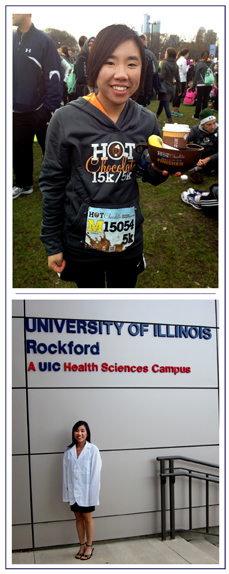 After my first year of pharmacy school, I was lucky enough to become the summer intern at ICHP this year. I am working on the ICHP Health-System Pharmacy Response Network (HSPRN) for Emergencies. On this project I will update the ICHP HSPRN key contact list. After I have finished updating the health-system pharmacies information, I will work on a practice emergency drill. The drill will ask for the pharmacy to respond with the quantity of a specific medication. The medication name, strength, and dosage form will be provided in a request form sent to both primary and secondary contacts via fax or email. The results from the drill will be analyzed focusing on response time, effort, and areas for improvement.
I am excited to work on the project and continue to make improvements for next year. The weeks here are flying by quickly and before I know it my ten weeks will be over. However, I am grateful to have the opportunity to work with everyone in the office. Scott, Trish, Jan, Maggie, Heidi, Jo, and Amanda are all super kind and friendly making a wonderful work environment.
After my first year of pharmacy school, I was lucky enough to become the summer intern at ICHP this year. I am working on the ICHP Health-System Pharmacy Response Network (HSPRN) for Emergencies. On this project I will update the ICHP HSPRN key contact list. After I have finished updating the health-system pharmacies information, I will work on a practice emergency drill. The drill will ask for the pharmacy to respond with the quantity of a specific medication. The medication name, strength, and dosage form will be provided in a request form sent to both primary and secondary contacts via fax or email. The results from the drill will be analyzed focusing on response time, effort, and areas for improvement.
I am excited to work on the project and continue to make improvements for next year. The weeks here are flying by quickly and before I know it my ten weeks will be over. However, I am grateful to have the opportunity to work with everyone in the office. Scott, Trish, Jan, Maggie, Heidi, Jo, and Amanda are all super kind and friendly making a wonderful work environment.
Columns
 President's Message
President's Message
Can We Change Course?
by Tom Westerkamp, ICHP President
1. God’s Little Devotional Book. Honor Books, Inc. Tulsa OK. 1995; p.143.
 Directly Speaking
Directly Speaking
It's Time to Trade Shoes
by Scott A. Meyers, Executive Vice President
I came home from the meeting with several important takeaways. The first huge takeaway is that patients deserve better education than they often get from us – and I’m talking about all of us. Many times patients go home on new medications that require special administration (e.g., injections, infusions, special inhalers) or have medications that require special timing or other requirements that if not followed can nullify their effect or cause additional problems. This shouldn’t be new to any of us. But are we owning the responsibility to make sure the patients not only receive an explanation of these requirements but actually understand them, can repeat them and even demonstrate them? Or do we assume that the community pharmacy that provides the medications in question provide the important and detailed training that should accompany them? We all know what the assume-game leads to, if not just watch the early part of “The Bad News Bears” circa 1976!
Counseling patients that are headed home doesn’t sound like it has anything to do with our long-term care colleagues but in fact, when pharmacists don’t counsel and educate a patient or their caregiver appropriately, they often end up in a long-term care facility. I heard some real horror stories from patient advocates who presented. The most embarrassing was the patient’s daughter who told the advocate, “The nurse in the hospital was kind enough to take a few minutes to show me how to do the injection.” Where was the clinical pharmacist? Who provided the medications for home use and why didn’t they make sure the caregiver was ready for the challenge?
The second takeaway related to medication reconciliation. Long-term care pharmacists are faced with the same med-rec challenges that hospital pharmacists face. They often receive hand-written discharge summaries (by the nursing staff) that fail to contain all the medications the patient should take or at least have access to if needed. You know the problems you face on the inpatient side when you try to determine what a new admission is on at home. Did we get all the OTCs, herbals and supplements? What was the green pill really supposed to treat? What kind of sugar pill was it that you’ve been taking and how often do you take it? You have those questions everyday if you’re performing med-rec, and the same thing is true of the long-term care pharmacist. However, they also deal with confused patients and caregivers who assume that they should restart some of the medications they were on before their hospitalization even though they weren’t getting them in the hospital and they don’t appear on the discharge summary. Maybe it’s time to look at your discharge system and see if the medication summary can’t be improved.
Hospitals are now being paid for performance and penalized for readmissions too soon. Our colleagues in the long-term care field can have a dramatic impact on readmission if we develop a stronger relationship with them. And when they do send someone back to the hospital from a rehab or nursing home facility, they can ease our workload by communicating an accurate medication history. I really think we need to build new relationships with the folks who receive more and more of our patients as the population ages.
A third takeaway is that it’s never too early to establish a Medical Power of Attorney” for yourself, your spouse, parents and other loved ones. Having the medical power of attorney in place protects you and your family members from unnecessary stress and expense. Hopefully you’ll never have to exercise that power of attorney but chances are very good that eventually you will. Having it in place makes care much easier. So maybe these shoes don’t belong to the long-term care folks but rather someone you love.
So what can the hospital pharmacist do to make life better for their patients when they leave the hospital? Make sure the patient or their caregiver or both, fully understand how, what and why of taking each medication to help reduce readmissions or admissions to the nursing home. If that requires establishing a medication education team, make sure it is overseen by pharmacists even if nurses are utilized. Develop iron-clad medication lists that go out with every discharge regardless of whether the patient is headed home, rehab or the nursing home.
Be prepared and willing to provide needed information to the pharmacist that picks up the patient on the other side of the discharge. They are health care providers and HIPAA allows you to provide the appropriate and critical information. Encourage patients to develop and build a relationship with a local pharmacy. When you find a pharmacy that does a great job with patient care, recommend it. You can do that! Make sure you and your family have established your medical powers of attorney. You hope to never use them, but preparation now will be priceless later.
I thoroughly enjoyed the time I spent at the ASCP Spring Meeting and Exhibition, and I learned more than I thought I would. I now feel stronger than ever that ICHP and all of Pharmacy needs to work harder on the continuity of care, transitions of care or whatever you prefer to call it. I hope that more will come from my experiences at this meeting and only time will tell.
One other nugget from the meeting, ASCP President, Sean Jeffrey announced at the meeting that ASCP will be changing their name! The Board of Directors feels strongly that the pharmacist members of ASCP are more than consultant pharmacists and there certainly should be a better description of their membership. My vote is the Association of Senior Care Pharmacists…I’m all for saving logos and acronyms!
New Practitioners Network
Volunteering + Networking + Fiesta = The Perfect ICHP Student Member Experience
by Han Ngo and Janey Yu, Incoming PS-3’s at Midwestern University
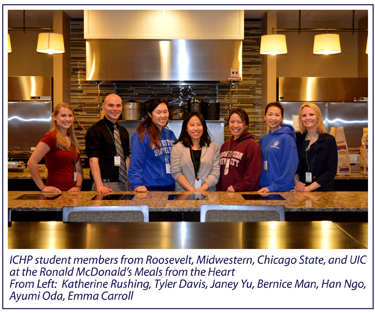 While working together in a single kitchen to prepare a meal for 70-80 people at the Ronald McDonald House, we also had a valuable opportunity to meet with other ICHP members from Roosevelt, UIC, and Chicago State University and current residents and practicing pharmacists from the Chicagoland area as well.
This was a great and memorable experience. It was interesting to learn from other students about their upcoming events they have planned for their student chapter. At first glance, you could not differentiate between student and faculty, but that was the beauty of this ambiguity because who knows what you could learn from each person you meet!
When you station a group of ICHP members in a single kitchen with taco ingredients, you are bound to have a fiesta from it all. There were endless cans of black beans, bags of shredded lettuce, a bed of diced tomatoes, a huge pot of Spanish rice, and pans of shredded seasoned pork and chicken. That evening, we proved that ICHP members are not only medication-use experts - we can also cook a tasty Mexican-style dinner and turn it into a buffet! It was a pharmacy fiesta!
Volunteering that evening and learning more about the Ronald McDonald House was fun and exciting. After volunteering, we had the opportunity to tour the House and realized how this House is a “home away from home”, since it provides the comfort of a home when a family experiences the hardship of having their child hospitalized. In addition, the opportunity to reconnect with familiar faces as well as form new bonds while preparing and serving a warm delicious meal to everyone at the House was a rewarding volunteer experience for our ICHP members.
For more information about the Meals from the Heart volunteer event or if you are interested in planning one please go to: http://rmhccni.org/meals-lurie/
While working together in a single kitchen to prepare a meal for 70-80 people at the Ronald McDonald House, we also had a valuable opportunity to meet with other ICHP members from Roosevelt, UIC, and Chicago State University and current residents and practicing pharmacists from the Chicagoland area as well.
This was a great and memorable experience. It was interesting to learn from other students about their upcoming events they have planned for their student chapter. At first glance, you could not differentiate between student and faculty, but that was the beauty of this ambiguity because who knows what you could learn from each person you meet!
When you station a group of ICHP members in a single kitchen with taco ingredients, you are bound to have a fiesta from it all. There were endless cans of black beans, bags of shredded lettuce, a bed of diced tomatoes, a huge pot of Spanish rice, and pans of shredded seasoned pork and chicken. That evening, we proved that ICHP members are not only medication-use experts - we can also cook a tasty Mexican-style dinner and turn it into a buffet! It was a pharmacy fiesta!
Volunteering that evening and learning more about the Ronald McDonald House was fun and exciting. After volunteering, we had the opportunity to tour the House and realized how this House is a “home away from home”, since it provides the comfort of a home when a family experiences the hardship of having their child hospitalized. In addition, the opportunity to reconnect with familiar faces as well as form new bonds while preparing and serving a warm delicious meal to everyone at the House was a rewarding volunteer experience for our ICHP members.
For more information about the Meals from the Heart volunteer event or if you are interested in planning one please go to: http://rmhccni.org/meals-lurie/

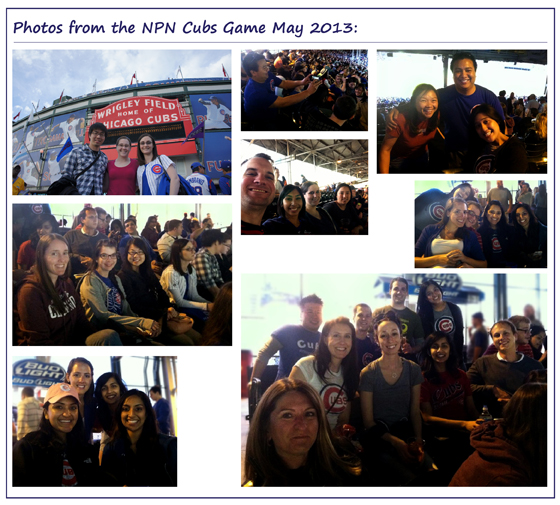
The GAS from Springfield
Session Ends, Pharmacy Escapes!
by Jim Owen and Scott Meyers
Leadership Profile
Kevin O. Rynn, PharmD, DABAT, FCCP
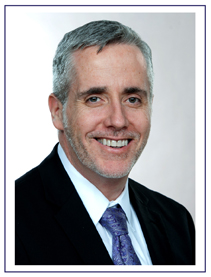 Where did you go to pharmacy school?
Where did you go to pharmacy school?
ICHPeople
Congratulations to Desi Kotis from Northwestern Memorial Hospital and Miriam Mobley-Smith from Chicago State University for being recognized as Fellows of the American Society of Health-System Pharmacists. Both ICHP members were given their award at the 2013 ASHP Summer Meeting in Minneapolis. To be selected as FASHP, members must have successfully demonstrated sustained commitment or contributions to excellence in practice for at least 10 years, contributed to the total body of knowledge in the field, demonstrated active involvement and leadership in ASHP and other professional organizations, and have been actively involved in and committed to educating practitioners and others.
College Connections
Pathways to Pharmacy in a Physics Class
by John Shilka, P-3, University of Illinois at Chicago College of Pharmacy
The morning of my arrival at the school I was slightly nervous, but mostly nostalgic. Walking into the school brought back memories of my own high school days, particularly those of career opportunities I was thinking about while in high school. While reminiscing, I realized that this was an important topic and we needed to provide as much valuable information as possible. These sets of lectures we were going to present could help a student choose a pathway into college and help change a life. When we approached the classroom and entered, we prepared our presentation and we learned a little about the school. The school's name is Urban Prep Academy and we presented at their Bronzeville campus. The school is an all-male high school that focuses on getting students into college and continuing their success throughout their college career. This was a perfect audience to talk to about getting involved in the pharmacy field
In order to be thorough in our lecture, our group decided to approach the topic on a multifaceted level. We used the ICHP PowerPoint™ presentation from the toolkit to present our ideas. Continuing our first approach we decided that we would talk to the students about the different opportunities for pharmacists and what sort of new services we are becoming involved in, such as vaccinations and health screenings. Next, we would touch on the real responsibilities of pharmacists in settings like community, hospital, and industry while we would compare them to what the students thought these responsibilities were. We also planned to add in information about the testing requirements (e.g. PCAT), grade point average requirements, pre-pharmacy information, and how they can get a head start by getting involved now.
In no time, students started arriving in class and we began greeting them with handshakes. The students seemed thrilled to see us and even filled out a worksheet while we presented the information. The amount of interest combined with their current knowledge was actually surprising. Much of the information that they were aware of, such as the responsibilities of a hospital pharmacist, was unknown to me during my high school days and I was already interested in pharmacy at that time. Although the students were informed, they still had plenty of questions to ask. Questions varied from test scores on the PCAT to how involved pharmacists were with the drug development process. Many students even shared their personal experiences with pharmacists and how they affected their life. At the end of each presentation we saw that a few students had become interested in the field and they may become our colleagues in the future. When we finished our presentations, we went to the back of the classroom to take a picture with the students. There we were able to have a quick conversation with a few of the students until they had to leave for their next class. After four sets of classes, we departed from the school, hopefully giving the students a unique look into a fantastic career.
When reflecting on this experience, I can say that it made me appreciate the work that pharmacists have put into teaching others about the profession. I was able to see this by the level of knowledge the students had about our responsibilities. I also hope that with our input we were able to educate the students about a pathway into pharmacy and even encourage some to try it themselves. I hope in the near future we are able to give additional lectures to students within the school on a variety of other topics.
New School Year
by Megan Herman, P-3, SSHP Vice President, Southern Illinois University Edwardsville School of Pharmacy
Our chapter of SSHP is looking forward to the 2013-2014 school year. The chapter plans to do more exciting things this year; we have new committee chairs and new organizations we can work with. There are many things our organization will continue to do, but we are also looking for new ways to expand our chapter and our profession.
One of the new positions this year is the PPMI Chair. We plan to become very involved with the PPMI. This chair will be involved with coordinating events with current preceptors who host pharmacy students. These events will help the current preceptors become more aware of just what the PPMI is and help them learn what they can do as preceptors. The chair has created a brochure for students to help them learn what they can do as students to become more involved with the PPMI initiative. I was told recently that we need to be the change in our profession. Our chapter plans to do just that this upcoming school year.
Along with the PPMI Chair, we have created a Community Outreach Chair. This chair will be involved with putting together events such as the “This Side of the Dirt” presentations. These presentations are given to middle school and junior high school students in the St. Louis area. They are about 30-45 minutes in length and are intended to teach the students that we want to keep them on “This Side of the Dirt” and not six feet under. During these presentations, the students learn about drug abuse, addiction, and what they can do to help.
Another group of individuals our chapter will continue to reach out to this year is the deaf community. I had a personal experience with this group and will be coordinating with the Community Outreach Chair this year to organize events for this community. It was a great experience and I would encourage more organizations to get involved. Our chapter is also getting involved with the local school of pharmacy, (St. Louis College of Pharmacy), to help with events to benefit the community. One of the activities we are looking to help with is gift bags for cancer patients.
For the upcoming school year, I would like our organization to grow and expand our profession. Our chapter has the goals set and we plan to achieve them. I hope everyone has a great rest of the summer.
A Reflection on Institutional Pharmacy
by Taylor R. Highland, P-2, ICHP Member and Vice-President of the Student Chapter, Chicago State University College of Pharmacy
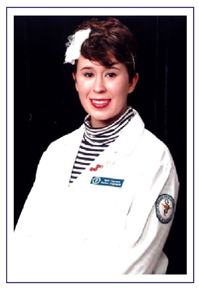 I will be reflecting upon my Introductory Pharmacy Practice Experience (IPPE) Institutional rotation at Presence St. Mary’s Hospital in Kankakee, Illinois. Saint Mary’s hospital is a rural acute care facility containing 186 beds with a level II Emergency/Trauma Center. I was there for eight hours per week during the second semester of my P-2 year. Before I was accepted into pharmacy school, I worked as an inpatient pharmacy technician in a similar hospital in central Illinois. Even though I worked three years as a technician, I never really got to see what a clinical pharmacist does. At St. Mary’s, the pharmacists have multiple responsibilities which include order entry and staffing as well as clinical responsibilities. Starting from day one, I was constantly paired with a pharmacist. Even though I worked in a similar hospital with the same Meditech™ computer system, it was interesting to be able to compare and contrast the differences in the workflow of the pharmacy and the utilization of the technology. The most empowering experience I gained from this rotation was being able to see the pharmacists in action on rounds and being able to take the knowledge I have gained in school and apply it to real life situations. Although I have two more years to go and most likely a residency after that, being able to see the role of the pharmacist participating in a multidisciplinary team gives me something to strive for.
I will be reflecting upon my Introductory Pharmacy Practice Experience (IPPE) Institutional rotation at Presence St. Mary’s Hospital in Kankakee, Illinois. Saint Mary’s hospital is a rural acute care facility containing 186 beds with a level II Emergency/Trauma Center. I was there for eight hours per week during the second semester of my P-2 year. Before I was accepted into pharmacy school, I worked as an inpatient pharmacy technician in a similar hospital in central Illinois. Even though I worked three years as a technician, I never really got to see what a clinical pharmacist does. At St. Mary’s, the pharmacists have multiple responsibilities which include order entry and staffing as well as clinical responsibilities. Starting from day one, I was constantly paired with a pharmacist. Even though I worked in a similar hospital with the same Meditech™ computer system, it was interesting to be able to compare and contrast the differences in the workflow of the pharmacy and the utilization of the technology. The most empowering experience I gained from this rotation was being able to see the pharmacists in action on rounds and being able to take the knowledge I have gained in school and apply it to real life situations. Although I have two more years to go and most likely a residency after that, being able to see the role of the pharmacist participating in a multidisciplinary team gives me something to strive for.Another side of institutional pharmacy that I was not exposed to previously as a technician was administration. During my rotation, I had the opportunity to participate in a Surgical Care Improvement Project (SCIP) meeting with the Directory of Pharmacy. During my rotation at St. Mary’s, they switched to Computerized Physician Order Entry (CPOE). Switching to this kind of order entry is an ongoing process and involves a lot of changes in the hospital. During this meeting, pharmacists and head nurses came together to discuss problems about the new system and solutions to those problems that suited everyone in order to maintain a smooth workflow and follow accreditation guidelines.
More
Officers and Board of Directors
TOM WESTERKAMP President
224-948-1528
tom_westerkamp@baxter.com
CHRIS RIVERS
Immediate Past President
Chairman, Nominations Committee
708-202-7240
criversrx@gmail.com
MIKE FOTIS
President-Elect
michael.fotis@northwestern.edu
MIKE WEAVER
Treasurer
815-599-6113
mweaver@fhn.org
KATHY KOMPERDA
Secretary
630-515-6168
kkompe@midwestern.edu
TRAVIS HUNERDOSSE
Director, Educational Affairs
Travis_Hunerdosse@rush.edu
EDWARD RICKERT
Director, Government Affairs
618-402-7416
erickert@kdlegal.com
JENNIFER ELLISON
Director, Marketing Affairs
Jennifer.C.Ellison@osfhealthcare.org
JENNIFER PHILLIPS
Director, Professional Affairs
Assistant Editor, KeePosted
630-515-7167
jphillips@midwestern.edu
LINDA FRED
Director, Organizational Affairs
217-383-3253
linda.fred@carle.com
ANN JANKIEWICZ
Chairman, House of Delegates
312-942-5706
ann_m_jankiewicz@rush.edu
ELIZABETH ENGEBRETSON
Technician Representative
815-756-1521x153346
EEngebretson@northshore.org
DAVID TJHIO
Chairman, Committee on Technology
816-885-4649
david.tjhio@cerner.com
JENNIFER ARNOLDI
Chairman, New Practitioners Network
JeArnol@gmail.com
JACOB GETTIG
Editor & Chairman, KeePosted Committee
630-515-7324 fax: 630-515-6958
jgetti@midwestern.edu
DESI KOTIS
Regional Director North
312-926-6961
dkotis@nmh.org
MARK LUER
Regional Director South
mluer@siue.edu
SCOTT BERGMAN
Regional Director Central
scbergm@siue.edu
EMMA CARROLL
President, Student Chapter
University of IL C.O.P.
emmacarroll620@gmail.com
NADIYAH CHAUDHARY
President, Rockford Student Chapter
University of IL C.O.P.
nadi925@gmail.com
JANEY YU
President, Student Chapter
janey.yu@mwumail.midwestern.edu
BERNICE MAN
President, Student Chapter
Chicago State University C.O.P.
bman@csu.edu
TRAMAINE HARDIMON
Student Representative
Chicago State University C.O.P
thardimon@csu.edu
ZAK VINSON
President, Student Chapter
Southern Illinois University S.O.P
zvinson@siue.edu
ALEX MERSCH
President, Student Chapter
Roosevelt University C.O.P.
amersch@mail.roosevelt.edu
JENNIFER AGUADO
President, Student Chapter
Rosalind Franklin University C.O.P.
jennifer.aguado@my.rfums.org
SCOTT MEYERS
Executive Vice President, ICHP Office
815-227-9292
scottm@ichpnet.org
ICHP AFFILIATES
JENNIFER PHILLIPS
President, Northern IL Society (NISHP)
630-515-7167
jphillips@midwestern.edu
JULIA SCHIMMELPFENNIG
President, Metro East Society (MESHP)
jschimmelpfen@sebh.org
MEGAN METZKE
President, Sangamiss Society
memiller8@yahoo.com
ED RAINVILLE
President, West Central Society (WSHP)
309-655-7331x
ed.c.rainville@osfhealthcare.org
Vacant Roles at Affiliates —
President, Rock Valley Society; Southern IL Society; Sugar Creek Society
Welcome New Members!
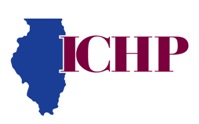
| New Members | Recruiter |
| Hamidah Damulira | |
| Heather Strawn | |
| Robert Chapman | |
| Rebecca Castner | Ann Jankiewicz |
| Andrea Rupniewski | |
| Courtney Herr | |
| Arthur Joseph | Selene Marquez |
| Ann Unanue | |
| Dave Hardik | |
| Michael Nolan | |
| Tramaine Hardimon | |
| Manali Soni-Talsania | |
| Lisa Deegan | |
| Jacob Bierman | |
| Negin Kiyavash | Ginger Ertel |
| Sawsan Ikram |
ICHP Pharmacy Action Fund (PAC) Contributors
GENERAL ASSEMBLY GUILD - $1000 & More Scott Bergman
Dan Ciarrachi
Kevin Colgan
Edward Donnelly
Andrew Donnelly
Dave Hicks
ICHP
James Owen Consulting Inc.
Frank Kokaisl
Scott Meyers
Michael Novario
Michael Rajski
Edward Rickert
Michael Short
Carrie Sincak
Avery Spunt
Michael Weaver
Patricia Wegner
Thomas Westerkamp
SPRINGFIELD SOCIETY - $500-$999
Jered Bauer
Ginger Ertel
Linda Fred
Ann Jankiewicz
Jan Keresztes
Kathy Komperda
Leonard Kosiba
Despina Kotis
Huzefa Master
William McEvoy
Christina Rivers
Miriam Mobley-Smith
JoAnn Stubbings
Cathy Weaver
Paul Zega
CAPITOL CLUB - $250-$499
Sheila Allen
Margaret Allen
Peggy Bickham
Jaime Borkowski
Timothy Candy
Rauf Dalal
Drury Lane Theater
Sandra Durley
Starlin Haydon-Greatting
Vern Johnson
George MacKinnon
Janette Mark
Heather Minger
Jennifer Phillips
Edward Rainville
Kathryn Schultz
Heidi Sunday
Jill Warszalek
Alan Weinstein
LINCOLN LEAGUE - $100-$249
Tom Allen
Anonymous
Jen Arnoldi
Jerry Bauman
Jill Borchert
Se Choi
Scott Drabant
Nancy Fjortoft
Nora Flint
Michael Fotis
Jacob Gettig
Gireesh Gupchup
Joann Haley
Joan Hardman
Travis Hunerdosse
James Jansen
Zahra Khudeira
Mary Lee
John LeGrand
Kristopher Leja
Phyllis Lulinski
George Lyons
Gloria Meredith
MWU COP Student Chapter
Peggy Reed
Katie Ronald
Don Shadensack
Kristi Stice
GRASSROOTS GANG - $50-$99
Sean Chantraparout
Jordan Cohen
Mark Deaton
Rhonda DePasquale
Glenna Hargreaves
Lois Honan
Charlene Hope
Diana Isaacs
Gerald Jablonski
Kim Janicek
Dwaine Keller
Colleen Kielch
Kati Kwasiborski
Kim Lim
Scott Metzger
Shannon Pace
Barbara Smith
Lucas Stoller
Carrie Vogler
Marie Williams
CONTRIBUTOR - $1-$49
Daniel Abazia
Amanda Bryant
Gabrielle Daniels
Agnes Dominic
Judy Douglas
Jeanne Durley
Kathy Eakright
Lara Ellinger
Jennifer Ellison
Brooke Griffin
Susan Hamilton
Richard Januszyk
George Jossel
Alex Lomahan
Bella Maningat
Sarah Matias
Lindsay McNeely
Virginia Nash
Karen Nordstrom
Gopi Patel
Jeremy Raschke
Jolee Rosenkranz
Jeri Rothman
Mark Ruscin
Ann Ryan
Allison Schriever
Wade Seggerman
Jennifer Splawski
Brandi Strader
Ellen Voelker
Shari Weyland
Laura Woskobnick
Izabela Wozniak
Upcoming Events
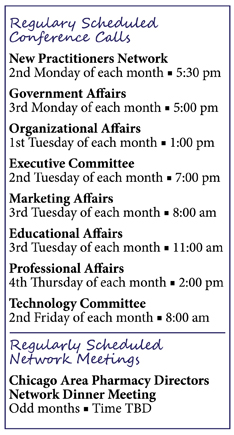 Saturday, July 20
Saturday, July 20Family Night at the Ballpark – Peoria Chiefs
Dozer Park | Peoria, IL
Wednesday, July 24
Pharmacy Directors Network Dinner
Via Carducci | Chicago, IL
12:00 pm Champion Webinar: Recent Updates in Hypertension - Focus on the Elderly
Online - Click here for instructions to access a Champion Webinar.
Saturday, July 27
Certificate Training Program for Pharmacists: Pharmacy-Based Immunization Delivery
Springfield, IL
Sunday, July 28
Certificate Training Program for Pharmacists: Delivering Medication Therapy Management Services
Springfield, IL
3:00 pm Champion Webinar: Recent Updates in Hypertension - Focus on the Elderly
Online - Click here for instructions to access a Champion Webinar.
Thursday, September 19 – Saturday, September 21
ICHP Annual Meeting
Drury Lane Theatre and Conference Center | Oakbrook Terrace, IL
Friday, September 20
Save the Date! ICHP 50th Anniversary Gala
Drury Lane Theatre and Conference Center | Oakbrook Terrace, IL
Tuesday, October 15
Submission Deadline: 2013 ICHP Student Chapter Video Contest

